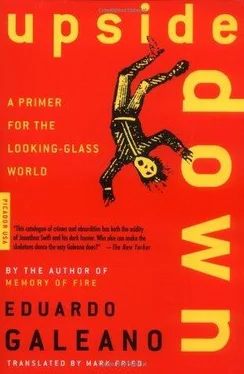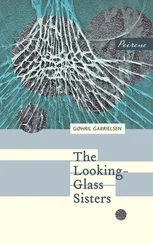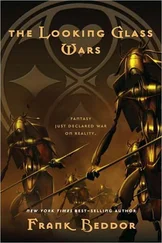——. Report 1997 (London, 1997).
Batista, Nilo. “Política criminal com derramamento de sangue.” Revista Brasileira de Ciências Criminais (São Paulo), no. 20, 1997.
Bergalli, Roberto. “Introducción a la cuestión de la droga en Argentina.” Poder y Control (Barcelona), no. 2, 1987.
Del Olmo, Rosa. “La cara oculta de la droga.” Poder y Control (Barcelona), no. 2, 1987.
——. ¿Prohibir o domesticar? Políticas de drogas en América Latina (Caracas: Nueva Sociedad, 1992).
——, et al. “Drogas: El conflicto de fin de siglo.” Cuadernos de Nueva Sociedad (Caracas), no. 1, 1997.
Human Rights Watch. “Colombia’s Killer Networks: The Military-Paramilitary Partnership and the United States” (New York: Human Rights Watch, 1996).
International Institute for Strategic Studies. The Military Balance, 1997–98 (Oxford: Oxford University Press, 1997).
Levine, Michael. The Big White Lie: The CIA and the Cocaine/Crack Epidemic: An Undercover Odyssey (New York: Thunder’s Mouth, 1993).
Miller, Jerome. Search and Destroy: African-American Males in the Criminal Justice System (Cambridge: Cambridge University Press, 1996).
National Institute on Drug Abuse. “National Household Survey on Drug Abuse: Population Estimates, 1990” (Washington: GPO, 1991).
Niño, Luis Fernando. “¿De qué hablamos cuando hablamos de drogas?” in Niño et al., Drogas: Mejor hablar de ciertas cosas (Buenos Aires: Facultad de Derecho y Ciencias Sociales, Universidad, 1997).
Reuter, Peter. The Organization of Illegal Markets: An Economic Analysis (Washington: Department of Justice, 1985).
Schell, Jonathan. “The Gift of Time: The Case for Abolishing Nuclear Weapons.” Nation (New York), February 2 and February 9, 1998.
Wray, Stefan John. “The Drug War and Information Warfare in Mexico.” Unpublished thesis, University of Texas at Austin, August 1997.
Youngers, Coletta. “The Only War We’ve Got: Drug Enforcement in Latin America.” NACLA Report on the Americas (New York), September — October 1997.
SEMINAR ON ETHICS
PRACTICUM: HOW TO MAKE FRIENDS AND SUCCEED IN LIFE
Arlt, Roberto. Aguafuertes porteñas (Buenos Aires: Losada, 1985).
Boff, Leonardo. A nova era: A civilização planetaria (São Paulo: Atica, 1994).
Calabrò, Maria Antonietta. Le mani della Mafia: Vent’anni di finanza e politica attraverso la storia del Banco Ambrosiano (Rome: Edizioni Associate, 1991).
Di Giacomo, Maurizio, and Jordi Minguell. El finançament de l’Església Catòlica (Barcelona: Index, 1996).
Feinmann, José Pablo. “Dobles vidas, dobles personalidades.” Página 30 (Buenos Aires), September 1997.
Greenberg, Michael. British Trade and the Opening of China (New York: Monthly Review Press, 1951).
Hawken, Paul. The Ecology of Commerce: A Declaration of Sustainability (New York: Harper Business, 1993).
Henwood, Doug. Wall Street (New York: Verso, 1997).
Lietaer, Bernard. “De la economía real a la especulativa.” Revista del Sur/Third World Resurgence (Montevideo), January — February 1998.
Newsinger, John. “Britain’s Opium Wars.” Monthly Review (New York), October 1997.
Pérez, Encarna, and Miguel Angel Nieto. Los cómplices de Mario Conde: La verdad sobre Banesto, su presidente y la Corporación Industrial (Madrid: Temas de Hoy, 1993).
Ramonet, Ignacio. Géopolitique du chaos (Paris: Galilée, 1997).
Saad Herrería, Pedro. La caída de Abdalá (Quito: El Conejo, 1997).
Silj, Alessandro. Malpaese (Milan: Donzelli, 1996).
Soros, George. “The Capitalist Threat.” Atlantic Monthly (Boston), February 1997.
Spiewak, Martin. “Bastechend einfach.” Das Sonntagsblatt (Hamburg), February 24, 1995.
Verbitsky, Horacio. Robo para la Corona: Los frutos prohibidos del árbol de la corrupción (Buenos Aires: Planeta, 1991).
World Bank. World Bank Atlas (Washington: World Bank, 1997).
——. World Development Indicators (Washington: World Bank, 1997).
——. World Development Report, 1995 (Oxford: Oxford University Press, 1996).
Ziegler, Jean. La Suisse lave plus blanc (Paris: Seuil, 1990).
——. La Suisse, l’or et les morts (Paris: Seuil, 1997).
LESSONS FOR RESISTING USELESS VICES
Cerrutti, Gabriela. Interview with Enrique Pescarmona. Página 12 (Buenos Aires), February 18, 1997.
Chomsky, Noam. Interview. La Jornada (Mexico), February 1, 1998.
“Conferencia de Lee Iacocca en Buenos Aires.” El Cronista. (Buenos Aires), November 12, 1997.
Economic Policy Institute. The State of Working America, 1996–1997 (Washington: Sharpe, 1997).
Figueroa, Héctor. “In the Name of Fashion: Exploitation in the Garment Industry.” NACLA (New York), January — February 1996.
Filoche, Gérard. Le travail jetable (Paris: Ramsay, 1997).
Forrester, Viviane. El horror económico (Mexico: FCE, 1997).
“The Gap and Sweatshop Labor in El Salvador.” NACLA (New York), January — February 1996.
Gorz, André. Misères du present, richesse du possible (Paris: Galilée, 1997).
International Labor Organization. World Employment Report 1996–1997 (Geneva: ILO, 1997).
——. Yearbook of Labor Statistics 1996 (Geneva: ILO, 1996).
——. Yearbook of Labor Statistics 1997 (Geneva: ILO, 1997).
Méda, Dominique. Le travail: Une valeur en voie de disparition (Paris: Aubier, 1995).
Moledo, Leonardo. “En defensa de los bajos sueldos universitarios.” Página 12 (Buenos Aires), December 2, 1997.
Montelh, Bernard, et al. C’est quoi le travail? (Paris: Autrement, 1997).
New York Newsday, August 7, 1992.
Rifkin, Jeremy. The End of Work (New York: Putnam’s, 1995).
Stalker, Peter. The Work of Strangers: A Survey of International Labour Migration (Geneva: ILO, 1994).
Van Liemt, Gijsbert. Industry on the Move (Geneva: ILO, 1992).
Verity, J. “A Company That’s 100 % Virtual.” Business Week (New York), November 21, 1994.
MASTER CLASS ON IMPUNITY
CASE STUDIES
Bañales, Jorge A. “La lenta confirmación.” Brecha (Montevideo), September 27, 1996.
Bassey, Nnimmo. “Only Business: A Pollution Tour through Latin America.” Link (Amsterdam), no. 80, September — October 1997.
Beristain, Carlos Martín. Viaje a la memoria: Por los caminos de la milpa (Barcelona: Virus, 1997).
Donovan, Paul. “Making a Killing.” New Internationalist (Oxford), September 1997.
Greenpeace International. The Greenpeace Book on Greenwash (Washington: Greenpeace, 1992).
Helou, Suzana, and Sebastião Benicio da Costa Neto. Césio 137: Conseqüências psicossociais do acidente de Goiânia (Goiás: Universidade Federal, 1995).
“Informe.” Uno más uno (Mexico), September 1985.
International Finance Corporation. Investing in the Environment: Business Opportunities in Developing Countries (Washington: World Bank, 1992).
Karliner, Joshua. The Corporate Planet: Ecology and Politics in the Age of Globalization (San Francisco: Sierra Club, 1997).
Monsiváis, Carlos. Entrada libre (Mexico: Era, 1987).
Poniatowska, Elena. Nada, Nadie: Las voces del temblor (Mexico: Era, 1988).
Читать дальше











